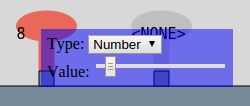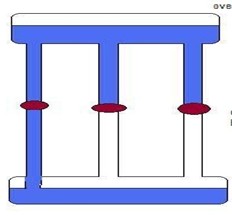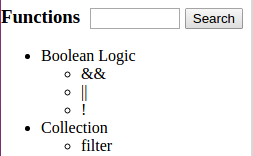What will happen if we separate a programming language in front-end and back-end? The back-end will be the programming language as we know it. But in the front-end we could add new features to it, for example:
- Translations
- Multiple ways of reading and writing the code. The code could behave as data, and we could have multiple views of it.
- etc.
This project is an experiment around this question.
- How this project started
- Benefits
- Paradigms
- Differences with similar projects
- Roadmap
- Further work
- License
- Development
- Tasks
I was working in a bootcamp as a teacher, and realized that there is a lot of incidental complexity when someone is learning to program.
We could use the ideas above to think of a programming environment that makes learning to program easier. Here are some ways in which applying this ideas could help:
- Having translations or a visual representation could help non-English speakers.
- Avoid the need to know all the syntax of a programing language before starting to program. You don't need to know where all the commas, parenthesis, brackets, keywords, etc. are placed.
- Teach programming concepts and not a programming language. General concepts could be applied to different programming languages later.
- All you need in one place: documentation, usage examples, tests, etc.
The project currently have the constraint that can only represent functional languages that have some kind of pattern matching or guards. For example: Haskell, Erlang, Elixir.
Anything is easy if you can assimilate it to your collection of models. If you can't, anything can be painfully difficult. Seymour Papert, Mindstorms.
It is not a new programming language.
The project takes a lot of inspiration from the following paradigms:
- Dataflow programming
- Visual programming
- Functional programming
- Live programming
This project differentiates by 3 main ideas of other visual programming environments:
- Uses Functional Programming
- The connections between blocks are as important as the blocks. In most of the other projects the connections are just lines.
- The execution flow is from top to bottom, not from left to right like in most projects. I think flow from top to bottom is more natural, an example in the real world is gravity.
The first step is to evaluate if the project will continue to be developed with react/redux/canvas. Using it in Firefox feels slow. I don't know if it is because my limited knowledge of react/redux, or because the project is not suited for using these technologies. Please open an issue with your OS, browser, pc specs if the project feels slow in your machine.
The same way as you select the values/types of the test inputs, you will select the value/type of the test output. If the test output is the same as the brick output there will be visual cue that the test is passing.
The only way to do control flow will be with multiple brick heads.
This way you could see the dataflow inside other bricks. Also expand bricks implemented by other people to see what is happening inside.
Just examples, the actual shortcuts will be defined later.
- B Add new brick
- C Add new constant
- L Link slots
- E Select element
I think that with just this shortcuts and some autocompletion you could program with fewer keystrokes than even inside an IDE. This is because with each shortcut you are narrowing a lot the potential following actions.
Wrap bricks inside a funnel, so it can flow through a pipe.
Add a search bar for bricks with autocompletion.
There will be the need to implement backends in different programming languages that can evaluate Lambda Bricks state.
- Do physical open-hardware toys that could teach programming to kids.
- Translate between code (in different languages) and brick visualization.
- Apply this ideas for tools in:
- Debugging
- Refactoring
- Navigating code
- Visualization of a project architecture
This project is licensed AGPL for non-commercial use. A donation to the project will be required for commercial use.
You need npm & browserify installed on your machine.
$ git clone https://github.com/lambdabricks/bricks-front-react.git
$ cd bricks-front-react
$ npm install
$ npm start
Open localhost:8080 in your browser.
TODO: Add description of the components and state of the application.




